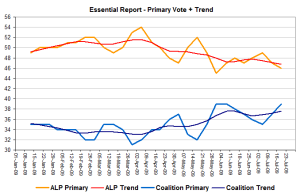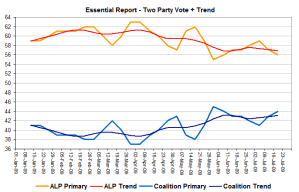Yesterday’s (apols for the lateness) Essential Report came in with the primaries running 46 (down 1) / 39 (up 2) to Labor, washing out into a two party preferred of 56/44 the same way – a one point gain to the Coalition from last week. This comes from a rolling two week sample of 1915, giving us an MoE that maxes out around the 2.2% mark.
It’s worth looking at the polling from Essential this year, as what comes out is a solid but subtle trend to the Coalition – including over the recent Ozcar period.
Other questions this week by Essential focused upon the economy, the CPRS, China and Uluru. These ran from a sample of 1070, giving an MoE around the 3% mark.
First up, possibly the longest question ever asked in the history of the Essential Report:
At the G8 summit in Italy, the leaders of the eight major industrial nations, including the US, UK, France and Germany, agreed developed nations should cut carbon emissions by 80 per cent by 2050 and developing countries, such as China and India, should cut theirs by 50 per cent by 2050 in bid to limit global warming to no higher than two degrees and reduce the risk of dangerous climate change. The Rudd Government has promised a cut of 60% by 2050. Do you think the Rudd Labor Government should increase its target to 80% in line with the goal of the leading developed countries, or leave it at 60%?
Essential says on the cross-tabs:
Respondents aged under 35 were more likely to think that the Rudd Labor Government should increase its target (49%), while respondents aged 55 years and over were more likely to think that the Government should leave the target at 60% (52%).
Labor and Green voters were more likely to think that the Rudd Labor Government should increase its target (48% Labor, 80% Green); while Coalition voters were more likely to think that the Government should leave the target at 60% (50%).
–
Do you think the Australian economy is over the worst of the slowdown resulting from the global financial crisis and is starting to improve or do you think it will still get worse before it starts to improve?
On the cross-tabs we have:
Males were more optimistic than females in thinking that the Australian economy is over the worst of the slowdown (57% v 48%).
Respondents aged over 55 were more likely than younger age groups to think that the Australian economy is over the worst of the slowdown (60%).
63% of Labor voters and 52% of Coalition voters thought that the Australian economy is over the worst of the slowdown resulting from the global financial crisis and that things are starting to improve. Green voters were more likely to think that the Australian economy will get worse before it starts to improve (45%).
It’s interesting that females are the more pessimistic sex considering that female employment has held up far better than male employment over the last 12 months.
The partisanship of economic expectations that we’ve previously looked at with the Newspoll Standard of Living poll is again repeated in the results here, with people whose party of choice is in government being far more optimistic than opposition voters.
Greens voters, much to the dismay of some of their supporters no doubt, again come in at rear on the optimism front – highlighting how the “we’ll all be rooned” set is a big part of their political demographic.
–
Do you think that Australian companies that do business in other countries should accept the laws and justice systems of those countries even if they are very different from our own – or should the Australian Government intervene if they think they have been unjustly treated?
The cross-tabs tell us:
Respondents aged 55+ were more likely than those in other age groups to think that Australian companies that do business in other countries should accept the laws and justice systems of those countries even if they are different from our own (71%).
Coalition voters were slightly more likely than Labor and Green voters to think that Australian companies that do business in other countries should accept the laws and justice systems of those countries even if they are different from our own (69% Coalition, 65% Labor and 61% Green).
–
Do you think the Rudd Government is taking the right approach or the wrong approach in dealing with the arrest of the Australian businessman Stern Hu in China?
On the cross-tabs, we have:
Respondents’ views on the issue followed party lines – Labor voters tend to think the Government has taken the right approach (46% right/13% wrong) while coalition voters are more likely to think that the Rudd Government has taken the wrong approach (26% right/35% wrong).
The high “Don’t Know” vote tells the story here – with the intricacies of diplomacy struggling to become a centerpiece of dinner table politics.
–
Do you think that Prime Minister Kevin Rudd’s knowledge and experience of China will influence how the Chinese Government handles the issue of the Australian businessman Stern Hu or will it make no difference?
The cross-tabs have us:
Labor and Green voters were a little more likely to think that the Prime Minister Kevin Rudd’s knowledge and experience of China will influence the Chinese Government (Labor 26% influence/53% make no difference; Greens 34%/53%) while 75% of Coalition voters think that it will make no difference.
Respondents aged under 35 were a little more likely to think the Prime Minister Kevin Rudd’s knowledge and experience of China will make no difference to how the Chinese Government handles the issue of the Australian businessman Stern Hu (25%), while respondents aged 55 years and over were more likely to think that it will make no difference (76%).
–
Indigenous leaders have called for a ban on climbing Uluru because of its spiritual significance. Do you support or oppose a ban on people climbing Uluru?
The cross-tabs tell an interesting story.
Respondents aged under 35 were more likely than older age groups to support a ban on people climbing Uluru (36%) – respondents aged 45+ were more likely to oppose a ban (58%).
Green voters were more likely than other voters to support a ban on the climbing of Uluru (60%) while Coalition voters were more likely to oppose a ban on climbing Uluru (68%).
Labor voters were split on the issue with 36% in support of a ban on people climbing Uluru and 43% opposed to the ban.
It’s almost a conforming to modern stereotype type story here, with Greens voters being far more culturally sympathetic to the views of local indigenous people, Coalition voters more likely to think it’s the White Mans way or the highway and ALP voters shooting right up the middle.















Crikey is committed to hosting lively discussions. Help us keep the conversation useful, interesting and welcoming. We aim to publish comments quickly in the interest of promoting robust conversation, but we’re a small team and we deploy filters to protect against legal risk. Occasionally your comment may be held up while we review, but we’re working as fast as we can to keep the conversation rolling.
The Crikey comment section is members-only content. Please subscribe to leave a comment.
The Crikey comment section is members-only content. Please login to leave a comment.